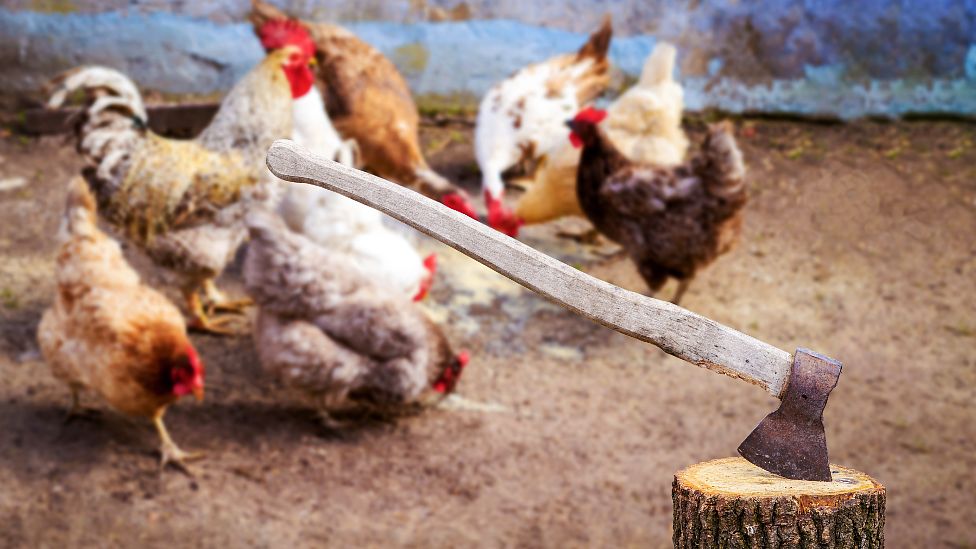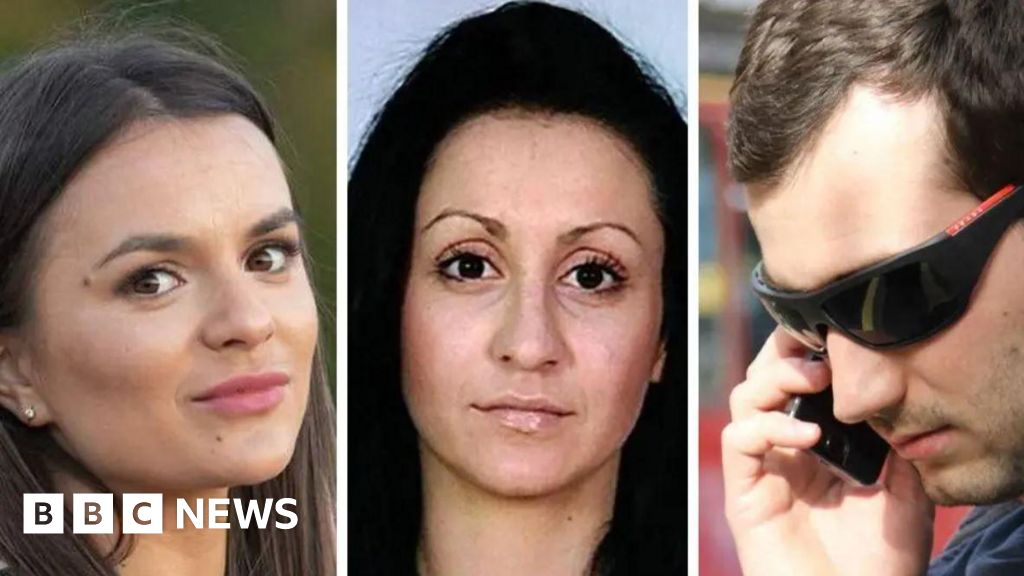ARTICLE AD BOX
 Image source, Getty Images
Image source, Getty Images
By Evelyne Musambi
BBC News, Nairobi
A viral video clip showing two primary school children slaughtering a chicken in Kenya has caused uproar and some hilarity about the country's new curriculum, which has more of a focus on practical skills.
During the outdoor lesson for 11 year olds on how to kill and cook a chicken, one boy is seen pinning down the fowl as another holds a knife nervously to its neck.
Some curious classmates watch as the teacher, who is filming the episode with his mobile phone, congratulates the boy for cutting off the head and then instructs another, who holding the body, to put it in a nearby cauldron of boiling water.
But as the child lets go over the pot, the headless chicken flaps its wings and escapes.
The 19-second clip ends with the teacher's laughter and the hapless and headless chicken still running around as screaming children scamper after it.
When a chicken's head is chopped off it can run around for several minutes as for a short period its spinal cord circuits still have residual oxygen.
It is unlikely to be something this grade-six class will forget.
The video sparked an outcry on social media with many people concerned about the safety of the children, although hardly anybody raised the issue of the chicken's suffering, asin rural Kenya, the sight of chickens being slaughtered is a common one.
Since they started primary school, they have been the guinea pigs for a new curriculum, and have experienced many different practical projects over the last few years - from making scarecrows to selling goods at markets.
Supporters of the Competency Based Curriculum (CBC) see them more as pioneers, saying it is an improvement on the old theory- and exam-based system as it better prepares them for life and to find jobs in the 21st Century.
They also argue that as there is continuous assessment it will reduce cheating in exams, which has been a massive problem for the government.
About 1.25 million grade-six pupils are soon to sit exams as part of the Kenya Leaving School Certificate that determines their entrance to secondary school.
For the first time, the exam will only contribute 40% to their final marks as their assessment scores since grade one will make up the rest.
'Feasting at parents' expense'
But some parents are unhappy at the expense of the new curriculum as schools expect them to contribute material and money for items - like chickens - needed for the practicals.
A home science teacher at Kangundo Primary School in eastern Kenya says that those from less well-off households are sometimes forced to watch others do their practicals.
"My grade-five pupils, for example, were sewing a handkerchief for their project and some could not afford to buy the fabric, so we ended up using the few that were bought by some pupils," Jemimah Gitari told the BBC.
Kenyan pupils now spend less time sitting at their desks, and more doing practical subjects
She feels some colleagues take advantage too - asking pupils to bring in meat, but she says this was not in fact compulsory for the stewing project.
"My school is in a village where some families cannot even afford a meal due to the rising cost of food so I couldn't ask them for meat," she said.
Following the chicken practical - done by grade-six pupils nationwide in September - photos were shared on social media which appeared to show teachers eating chicken in a staffroom.
An MP from western Kenya, Didmus Barasa, accused them of feasting on food paid for by parents who could ill afford it.
"Now there are no hens in homesteads," he said in remarks which angered the teachers' union.
The heated chicken debate even reached the ears of Kenya's newly elected President William Ruto, who has since set up a 49-member task force to evaluate the new curriculum, which was a pet project of his predecessor, Uhuru Kenyatta.
It has until the end of the year to make recommendations about whether the CBC rollout should continue for the grade-six students going into their first year of secondary school, which starts in January.
"The books and curriculum designs are ready but we are holding on to get advice before we can distribute them," Prof Charles Ong'ondo, who heads The Kenya Institute of Curriculum Development, told the BBC.
Some parents do not mind the practical side of the curriculum, but say it lacks balance as book work suffers.
"My daughter, who is in grade four, is doing 12 subjects and each of them has a project. They spent most of their time last term doing projects and so most classwork was not covered," Rozina Kisilu, a mother of two who lives in the capital, Nairobi, told the BBC.
The focus on practicals makes it harder for teachers to finish the syllabus in time, adds Ms Gitari - pointing to the two-week interruption to the last term because of the general election.
In fact the last two academic years have been unusual, with four instead of three terms - to make up for time lost during the Covid pandemic.
Others argue it will just take time for teachers to get to grips with the new curriculum.
This also came in for criticism recently when several videos trended showing pupils in rural areas lying on the ground pretending to swim as they had no access to a swimming pool.
But Nairobi teacher Marion Muthoni says the physical activity project gave teachers two options: pupils could either swim or skip using a rope depending on their facilities.
"Some of my colleagues are just exaggerating things. The things I've seen on social media are quite different from the guidelines we have. With time, teachers will realise not everything needs to be practical," Ms Muthoni told BBC.
Teachers say they need more time time to implement the new curriculum
Indeed the recommendation of the Kenya National Union of Teachers (KNUT) after a two-year pilot was that the CBC should not be introduced across the board until teachers were properly trained.
Some educationists recommend that a pilot should allow for a complete education cycle before a full rollout is considered so that adjustments can be made.
Sophia Mbevi, the director of a private school in Nairobi, agrees, saying that while the CBC had the best intentions, it was too hurriedly implemented.
Her school offers an alternative curriculum - which under Kenya law is allowed for private institutions as long as it is approved by the education department.
Some parents who can afford it are opting for private schools with established curriculums, like the one Ms Mbevi heads, as they do not want their children's future to be an experiment.
"There are far-reaching implications to overhauling an education system. A lot needs to be done to expand resources and train teachers before a full rollout," Ms Mbevi told the BBC.
"I just hope we can stop politicising education and do the right thing to ensure good quality education for the children."
The fate of the CBC now rests with the task force, which has six months in total to give its full evaluation.
Ms Mbevi suggests that one solution would be for the government to invest in community learning centres where "learners could be assisted to complete their projects, especially in households where the parents themselves are school drop-outs".
And to further ease the burden on parents and address the social divide, Ms Muthoni says the government should provide some of the materials needed for projects.
As to whether this should include live chickens, she suggested that schools should rear their own.

 2 years ago
21
2 years ago
21








 English (US) ·
English (US) ·